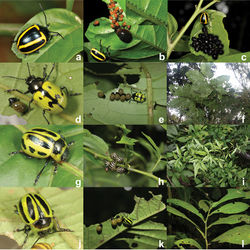Proseicela bicruciata
| Notice: | This page is derived from the original publication listed below, whose author(s) should always be credited. Further contributors may edit and improve the content of this page and, consequently, need to be credited as well (see page history). Any assessment of factual correctness requires a careful review of the original article as well as of subsequent contributions.
If you are uncertain whether your planned contribution is correct or not, we suggest that you use the associated discussion page instead of editing the page directly. This page should be cited as follows (rationale):
Citation formats to copy and paste
BibTeX: @article{Windsor2013ZooKeys332, RIS/ Endnote: TY - JOUR Wikipedia/ Citizendium: <ref name="Windsor2013ZooKeys332">{{Citation See also the citation download page at the journal. |
Ordo: Coleoptera
Familia: Chrysomelidae
Genus: Proseicela
Name
Proseicela bicruciata Jacoby, 1880 – Wikispecies link – Pensoft Profile
Remarks
Strong indications of maternal care in Proseicela bicruciata (Fig. 3d) were gathered by G.D. while walking trails in the montane cloud forest of the Yanayacu Biological Station and Center for Creative Studies, Napo Province, Ecuador (2150 m elevation, 0°36.27'S, 77°53.25'W) during the first week of July 2011. A total of five females were found, each tending small groups of uniform larvae (Fig. 3e), on the undersides of large leaves of Solanum abitaguense S. Knapp growing in streamside habitats (Fig. 3f). The group containing the smallest larvae was composed of nine individuals, while groups with larger larvae contained five and six individuals. The group with five larvae had two individuals separated on leaves 20–30 cm in different directions from the central three larvae arranged in a small rosette with heads to the inside and the mother to the side.
Taxon Treatment
- Windsor, D; Dury, G; Frieiro-Costa, F; Susanne Lanckowsky, ; Pasteels, J; 2013: Subsocial Neotropical Doryphorini (Chrysomelidae, Chrysomelinae): new observations on behavior, host plants and systematics1 ZooKeys, 332: 71-93. doi
Images
|
